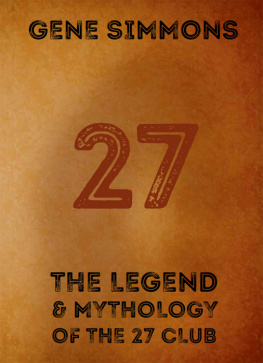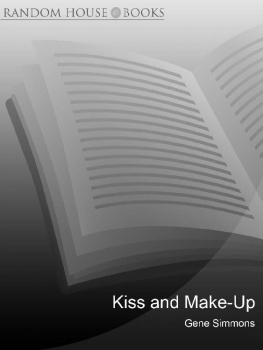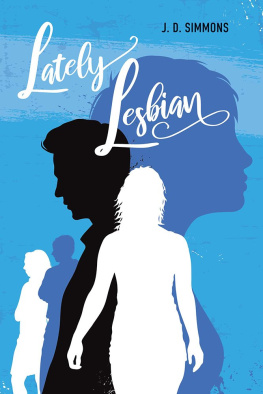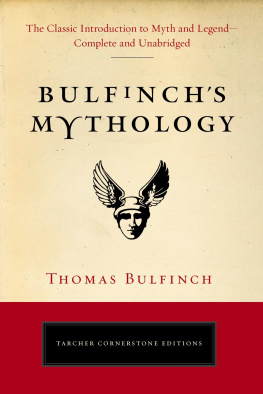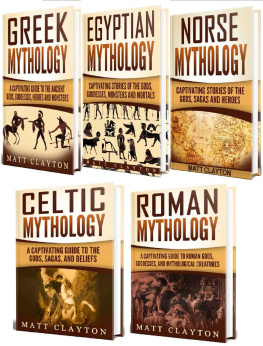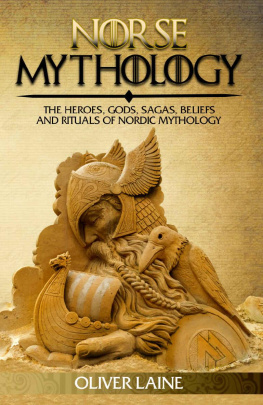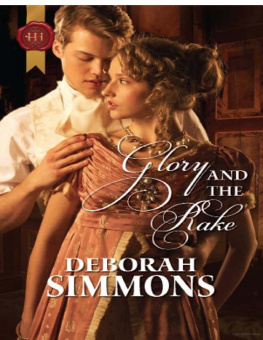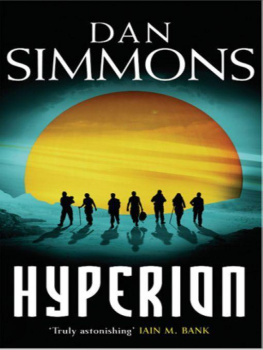Gene Simmons - 27: The Legend and Mythology of the 27 Club
Here you can read online Gene Simmons - 27: The Legend and Mythology of the 27 Club full text of the book (entire story) in english for free. Download pdf and epub, get meaning, cover and reviews about this ebook. year: 2018, publisher: powerHouse Books, genre: Religion. Description of the work, (preface) as well as reviews are available. Best literature library LitArk.com created for fans of good reading and offers a wide selection of genres:
Romance novel
Science fiction
Adventure
Detective
Science
History
Home and family
Prose
Art
Politics
Computer
Non-fiction
Religion
Business
Children
Humor
Choose a favorite category and find really read worthwhile books. Enjoy immersion in the world of imagination, feel the emotions of the characters or learn something new for yourself, make an fascinating discovery.
- Book:27: The Legend and Mythology of the 27 Club
- Author:
- Publisher:powerHouse Books
- Genre:
- Year:2018
- Rating:5 / 5
- Favourites:Add to favourites
- Your mark:
- 100
- 1
- 2
- 3
- 4
- 5
27: The Legend and Mythology of the 27 Club: summary, description and annotation
We offer to read an annotation, description, summary or preface (depends on what the author of the book "27: The Legend and Mythology of the 27 Club" wrote himself). If you haven't found the necessary information about the book — write in the comments, we will try to find it.
27: The Legend and Mythology of the 27 Club — read online for free the complete book (whole text) full work
Below is the text of the book, divided by pages. System saving the place of the last page read, allows you to conveniently read the book "27: The Legend and Mythology of the 27 Club" online for free, without having to search again every time where you left off. Put a bookmark, and you can go to the page where you finished reading at any time.
Font size:
Interval:
Bookmark:

Lifes a funny thing.
Nobody wants to get old,
but they dont want to die
young, either.
-KEITH RICHARDS
________________
Keith Richards: Under the Influence (US: 2015), dir. Morgan Neville, prod. Tremolo Productions/Radical Media, dist. Netflix, 81 mins.




This book is dedicated to everyone whose lives have been affected by mental illness, addiction, or both, especially the young musicians out there who struggle but who still dream of picking up a guitar, sitting down at a keyboard, or picking up a microphone.
Keep going.



Introduction
It is the year 2018, and we are losing legends like leaves in autumn. The end of my era, and the era that inspired my era, is on its way. McCartney and the Stones chug away with gusto, but there is no denying the waning of a certain creative golden era in pop culture. There will be a time when all the icons of a certain kind, finally, are gone. In the past two years alone, weve lost David Bowie, Prince, Tom Petty, Glenn Fry, my dear friend Hugh Hefner, Harry Dean Stanton, Chris Cornellthe list goes on, and trying to be exhaustive makes leaving out someone important an inevitability.
When they leave us, we tend to make saints of them or, at the very least, romanticize them. Death puts us all in a reflective and revisionist mood, and we polish, if not actively rewrite, the histories of our heroes. We build them up or tear them down, and construct narratives around their passing that make sense to us. At times, it is justified; at other times, we are biased and our emotions get the better of us.
Why so many, now? Why all at once, so close together, barely giving us time to take a breath and grieve before the next? Looking for patterns is simply what we, as humans, do. We are pattern-seeking animals, and it is in our nature to make sense of things that throw our lives out of order.
By my lights, the reason (if there really is just one reason) that so many are dying now is because there was a magical period of time when pop cultural Legends, with a capital L, were born, all very close to one another. A special kind of figurea timeless figure, from a unique era; it is only natural that they should all reach their twilight years at around the same time as well. The generational wheel turns and takes entire cultural movements with it. It stands to reason that there is one generation, one chunk of time, that was uniquely influential, because we notice all of our legends die at once when it comes to pass. Narrowly, I judge this magic time as the early-60s to the late-70s, but there are notable exceptions outside of those sand-drawn lines, as there are to every rule. Elvis is one exception.
Our obsession with celebrity death is only exceeded, it seems, by our obsession with young celebrity death. When cultural figures pass in their twilight years, we can process it as somehow comprehensible, although sad. Our refection on their careers is appropriately calmless frenzied and conspiratorial. However, when a figure seems to pass in their greatest strides, at the peak of our expectations for them, we tend to obsess, and even aggrandize it as somehow exciting or mythical. We invent conspiracy theories. We are shell-shocked, confused, fascinated. We analyze, review, replay again and again. Perhaps this is all simply our way of trying to make sense of senseless things.
After 1969, a slew of major musicians all died in quick succession. Brian Jones (founding member of the Rolling Stones), Janis Joplin, Jimi Hendrix, and Jim Morrison of the Doors, arguably the biggest rock stars of their time, all passed at 27 years of age, within just three years of each other.
Whether this was coincidence, simply a logical result of their lifestyle choices, drugs or mental illness, the pressures of being a public figure, or some combination of all of these factors combined, people began to notice a pattern. Correlation began to equal causation in the public imagination. An urban myth, and subsequent cultural fixation, was born: the 27 club.
As the idea gained traction, pre-1960s figures such as Robert Johnson (one of the, if not the, most influential bluesmen of all time), also dead at 27, were included, as well as post-1980s figures such as Kurt Cobain and Amy Winehouse. The true origin of the word club in the term 27 club is unknown, and there are a few different theories thrown around about who said it first.
For most people, the question nags: why 27 specifically? What is so unique and deadly about that number? Why so many, why the most famous, the most revered? Was there some sort of curse, some sort of reason for it all? An ideathat there were more deaths of famous musicians and cultural figures at 27 than at any other agetook form, spread, and conspiracies began to formulate.
Now, this supposed statistical spike of musicians dying at 27 is not quite trueas it happens, almost as many famous musicians die at 25, or 32.
But, since when has hard science ever dissuaded the mob or the media? A cultural obsession was taking form, an urban myth was spreading, and it bled across the years into the 90s. As it is with many conspiracies and urban legends, this one contained a kernel of truth: fame and youth can be a destructive combination. Though the number 27 does not appear to be significant, youth and fame more generally is statistically different. The study found that, the risk of death for famous musicians throughout their 20s and 30s was two to three times higher than the general UK population.
The 27 club, then, can be viewed as symbolic of this trend, even if age 27 is not, in fact, its sole peak.
When writing a book about this sort of topic, being sensitive, while still being brave enough not to shy away from the facts, is important. Needless to say, being sensitive has not always been my strong suit, but Ill try. While fans naturally deify their heroes, these figures were people of flesh and blood, like the rest of us, and many of them are survived by loved ones who do not view their demise as romanticand who loathe the constant speculation, tabloid attention, and conspiracy theories that fans bombard them with daily.
The concept of the 27 club, in my view, should not be about how glamorous it is to die youngat the peak of success, in a furry of drugs and excess. This is the way it is usually described, and Ive been vocal about disapproving of this line of thinking. Even those who, themselves, participate in drug-use and excess are not necessarily on board with its glamorization; Kurt Cobain himself, to his credit, said in an interview, I never went out of my way to say anything about my drug use [] I think people who glamorize drugs are fucking assholes, and if theres a hell, theyll go there. I tend to agree. To the families and friends of these people, and of people all around the world who met similar fates at the hands of that deadly cocktail of drug use and mental illness, there is nothing glamorous or heroic about losing someone you love, or losing your own life.
Next pageFont size:
Interval:
Bookmark:
Similar books «27: The Legend and Mythology of the 27 Club»
Look at similar books to 27: The Legend and Mythology of the 27 Club. We have selected literature similar in name and meaning in the hope of providing readers with more options to find new, interesting, not yet read works.
Discussion, reviews of the book 27: The Legend and Mythology of the 27 Club and just readers' own opinions. Leave your comments, write what you think about the work, its meaning or the main characters. Specify what exactly you liked and what you didn't like, and why you think so.

